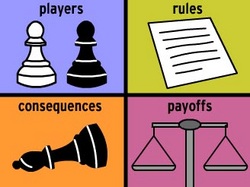"[Game theory] is the science of strategy. It's recognizing that the success of what you do depends on what other people do."
- Barry Nalebuff, Yale economics professor
- Barry Nalebuff, Yale economics professor
Game Theory: A set of concepts aimed at decision making under specified rules.
Game theory involves strategy but not chance (chess vs. rolling a die). The final outcome of a game is determined by the strategies that the two players use. A large factor that plays into game theory is uncertainty. This means that both players are not sure of what the other will decide.
The basis of game theory is trying to figure out what the other person is going to do and what the other person thinks you're going to do. A successful outcome of what you do depends on what other people do, how they react to what you do, and how you think they're going to react to what you do. Game theory explains how two people in a game choose their actions (or "moves") to receive the maximum gain, according to the other person's actions.
Game theory categorizes games into two types. The first is the ZERO SUM GAME. In this type of game, the amount of "reward" or "prize" is fixed. Therefore, whatever is gained by one player is lost by the other. This game applies to a simple competitive situtation, like a sports game or a contest in which there is only one winner. It could also apply to the Prisoner's Dilemna. The second game is the NON ZERO SUM GAME. In this type, the total amount of "reward" or "prize" at the end varies. Therefore, both players could potentially win (or lose). This type of game could apply to a race that was tied, like in swimming or track. In this case, both participants would win the same title.
The basis of game theory is trying to figure out what the other person is going to do and what the other person thinks you're going to do. A successful outcome of what you do depends on what other people do, how they react to what you do, and how you think they're going to react to what you do. Game theory explains how two people in a game choose their actions (or "moves") to receive the maximum gain, according to the other person's actions.
Game theory categorizes games into two types. The first is the ZERO SUM GAME. In this type of game, the amount of "reward" or "prize" is fixed. Therefore, whatever is gained by one player is lost by the other. This game applies to a simple competitive situtation, like a sports game or a contest in which there is only one winner. It could also apply to the Prisoner's Dilemna. The second game is the NON ZERO SUM GAME. In this type, the total amount of "reward" or "prize" at the end varies. Therefore, both players could potentially win (or lose). This type of game could apply to a race that was tied, like in swimming or track. In this case, both participants would win the same title.
Applied to Gambling
To learn about game theory applied to Gambling watch this video of Barry Nalebuff, a Yale professor and game theory expert.
hi
Work Cited (for ALL game theory pages)
http://www.businessdictionary.com/definition/game-theory.htmlhttp://4.bp.blogspot.com/__NjVMnN76xQ/TGZ4542wLNI/AAAAAAAABm4/YkZmsws1IzY/s1600/prisoners_dilemma_2.gif
http://bigthink.com/ideas/5688
http://thoughtstreak.wordpress.com/major-old-posts/applying-game-theory-into-everyday-life/
http://money.bundle.com/article/spousonomics-part-i-art-marital-compromise
http://money.bundle.com/article/spousonomics-part-iv-dodging-marital-game-chicken
http://money.bundle.com/article/spousonomics-part-ii-getting-your-significant-other-do-what-you-want
http://money.bundle.com/article/spousonomics-part-v-division-labor
http://money.bundle.com/article/spousonomics-part-iii-discovering-trade-offs-work-your-marriage
http://www.mydaily.com/2011/02/17/spousonomics-economic-theory-key-to-a-happy-marriage/
http://gliddofglood.typepad.com/the_glidd_of_glood_blog/2010/04/game-theory-the-prisoners-dilemma-and-romantic-relationships.htmlhttp://press.princeton.edu/chapters/i7517.html
http://www.businessdictionary.com/definition/game-theory.htmlhttp://expertvoices.nsdl.org/cornell-info204/2009/05/08/game-theory-in-relationships/
http://thoughtstreak.wordpress.com/major-old-posts/applying-game-theory-into-everyday-life/
http://www.businessdictionary.com/definition/game-theory.htmlhttp://4.bp.blogspot.com/__NjVMnN76xQ/TGZ4542wLNI/AAAAAAAABm4/YkZmsws1IzY/s1600/prisoners_dilemma_2.gif
http://bigthink.com/ideas/5688
http://thoughtstreak.wordpress.com/major-old-posts/applying-game-theory-into-everyday-life/
http://money.bundle.com/article/spousonomics-part-i-art-marital-compromise
http://money.bundle.com/article/spousonomics-part-iv-dodging-marital-game-chicken
http://money.bundle.com/article/spousonomics-part-ii-getting-your-significant-other-do-what-you-want
http://money.bundle.com/article/spousonomics-part-v-division-labor
http://money.bundle.com/article/spousonomics-part-iii-discovering-trade-offs-work-your-marriage
http://www.mydaily.com/2011/02/17/spousonomics-economic-theory-key-to-a-happy-marriage/
http://gliddofglood.typepad.com/the_glidd_of_glood_blog/2010/04/game-theory-the-prisoners-dilemma-and-romantic-relationships.htmlhttp://press.princeton.edu/chapters/i7517.html
http://www.businessdictionary.com/definition/game-theory.htmlhttp://expertvoices.nsdl.org/cornell-info204/2009/05/08/game-theory-in-relationships/
http://thoughtstreak.wordpress.com/major-old-posts/applying-game-theory-into-everyday-life/

